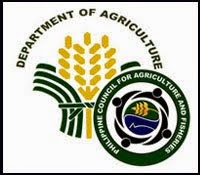The Department of Agriculture and
International Finance Corporation conduct a stakeholders’ consultation to
generate insights from the private sector on some of the issues and challenges
in the trade logistics of the country’s agribusiness supply chain.
The Department of Agriculture (DA)taps the National Agricultural and Fishery Council (NAFC), itsparticipatory arm, for the conduct of the stakeholders’ consultation last May 22 at the NAFC Apacible Conference Room, DA Building, Quezon City in line with the Cooperation Agreement signed last May 2 between the DA and the International Finance Corporation (IFC) of the World Bank Group.
The said Cooperation Agreementaims to further enhance the systems and procedures particularly in the sanitary and phytosanitary (SPS) import and export clearances and certificates as well as risk management for quarantine and inspection.
The private sector consultative meeting is part of the line-up of support activities for the Technical Kick-Off Mission which includes monitoring and evaluation and socialization of reforms.
The meeting served as a venue for the IFC delegates, led by the IFC technical consultant Theresa Morrissey and IFC Operations Officer Gerlin May Catangui, to generate inputs and feedback from the private sector on the country’s import and export rules and regulations, specifically on SPS policies and measures.
“We would really like to find out the challenges, gaps and issues that you see in terms of border management and control. We are focusing on SPS issues, in procedures and processes and how do you find going through these rules and procedures in terms of importing and exporting. Are there issues on risk management processes and how would you like these to be addressed or improved, as the case may be,” Catangui, who serves as the project’s transaction lead, said in her opening message.
The discussions focused on agribusiness trade logistics where breakout sessions were held for an open exchange of insights on barriers and bottlenecks, aspects that need to be improved and are important to retain, and the benefits and cost savings.
The outputs of the stakeholder consultation, along with the generated inputs from other consultations, will be analyzed by the IFC team and will be considered in the report to be preparedfor the DA. The report will provide an insight on how to improve and enhance the import and export process systems of the country through different project and program recommendations.
“We are hoping that by July, based on these consultations, we will have a report for consideration of the DA Secretary. From there, we will discuss with the DA what would be the next steps in terms of implementing the proposals for reform. We are hoping that because of this project, we will be engaged with the DA with a two-year program. Hopefully by 2015, we could implement reform projects that would help (the private sector) ease doing business with the DA in terms of importing and exporting,” Catangui added.
 |
IFC Operations Officer Gerlin May Catangui, IFC technical consultant Theresa Morrissey and DA SPS Desk Officer Maribel Marges facilitate the discussions during the DA-IFC stakeholder consultation.
“So far, we’ve had a really good week and a half with the people from the DA who’ve actually spoken about some of the issues that they experience, some areas where they believe they could streamline their processes to make it easier for you who are the importers and the exporters or if you’re involved in shipping and logistics. That’s quite a brave move on the part of the DA to open themselves up for the sort of scrutiny that we’re taking them through at this point in time,” Morrissey told the stakeholders.
DA’s SPS Desk Officer and National SPS Contact Point Maribel Marges, who was at the meeting to representDA Undersecretary for Policy, Planning, Research and Development and Regulation Segfredo Serrano, stressed that the views, insights, feedback, suggestions and recommendations gathered in the consultation are crucial for the achievement of the objective of the cooperation agreement.
“In the end, the ultimate goal is to help us achieve competitiveness in global trade,” she said, addressing around 60 representatives from various industry associations, confederations, import and export companies and associations concerning food and agri-fishery products who were present at the meeting.
Other activities held prior to the stakeholders’ consultation were the strategy meeting withUsec. Serrano, meetings with different DA regulatory agencies and other government agencies concerned with import and export, and ocular visits to different ports and laboratories.
In the pursuance of the agreement, focal persons from various DA service units such as the Policy Research Service, Planning Service and Project Development Service, and attached agencies such as NAFC, Bureau of Plant Industry, Bureau of Animal Industry, Bureau of Fisheries and Aquatic Resources,National Meat Inspection Service and Bureau of Agriculture and Fisheries Product Standards, among others, have been tasked to work with the IFC.
The DA and IFC team will review and assess the SPS import and export clearance systems and procedures, recommend policy and regulatory reforms, recommend process re-engineering, capacity-building on the new system for the relevant staff, and enhance and harmonize the risk management regime for quarantine and inspections.
IFC is an international organization affiliated with the World Bank Group with the mission of promoting sustainable private sector investments in developing countries to help reduce poverty and improve people’s lives.
|
|







